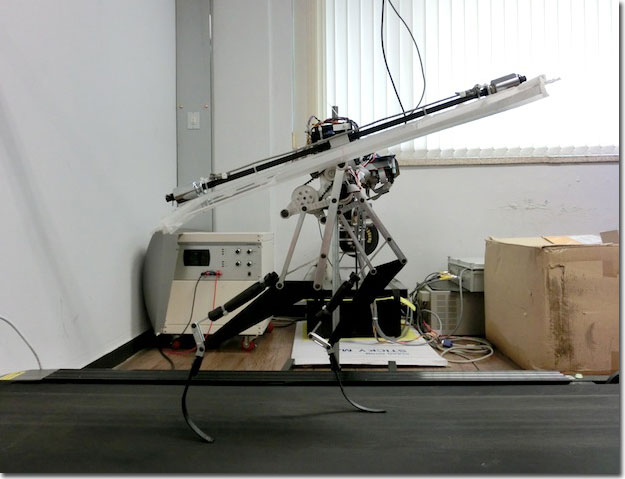Robot Wars: Velociraptor vs. Cheetah
 Image: KAIST Mechatronics, Systems, and Control Lab
Image: KAIST Mechatronics, Systems, and Control Lab
A robotic dinosaur, based on the structure of the Cretaceous dinosaur, Velociraptor, is on its way to becoming the first robot to break famous Olympic runner Usain Bolt’s record. The robot has already managed to attain speeds that are greater than Bolt’s.
The new creation was the brainchild of the researchers at KAIST (Korea Advanced Institute of Science and Technology) MSC Lab. However, it finds close competition in the form of the Cheetah, another robot developed by Boston Dynamics, which, as the name suggests, was modelled after the fastest animal alive.
The dinosaur model, named the Raptor after ironically dropping off that part of the name which stands for “fast”, can reach impressive speeds while running on two legs. The robot can clock in at speeds of 46 kph or 28.5 mPH on a treadmill.
That speed is faster than Usain Bolt who currently holds the title of fastest human alive with a recorded top speed of 44.72 kph or 27.44 mph, and close to the top speed of the Cheetah, which attained 47 kph or 29.3 mph in September 2012.
Despite being robots, the two models vary significantly. While the Cheetah is bulky and has a solid feel, the Raptor is both minimal and lightweight.
It does not have any solid feet, instead possessing two flexible carbon-fibre prosthetic blades on lightweight legs that are equipped with one motor each. The presence of a tendon allows the legs of the robot to reclaim a portion of the energy it expends in the process of running.
The Raptor has its own tail which it uses to gain balance. Even though it does not look similar to an actual Velociraptor tail, the function is rather similar.
The tail is basically a pole attached to the side of the robot which sings as the Raptor runs, providing a sort of counterweight to keep it from falling backwards or forwards.
The Cheetah may seem to be faster but when the first set of speed tests for the robot took place in March 2012, it could only attain 30 kph or 18 mph. Both the robots must be attached to a rail at all times in order to prevent them from falling over.

